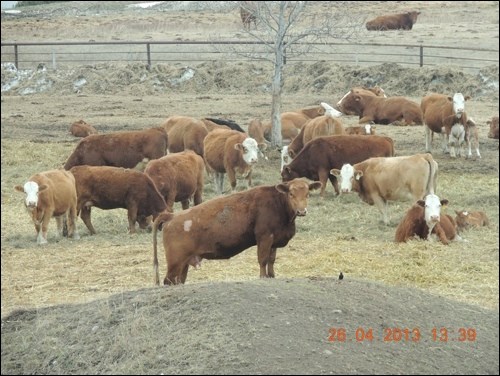Beef producers should not be in a rush to get their cows out of the drylot and into the summer range, unless special steps have been taken to provide them with early spring pasture.
The cows should be kept on winter rations until there is substantial grass in the pasture.
They cannot get enough nutrition from the first tufts of spring grass and may actually starve themselves nutritionally to the point of losing substantial weight. It is estimated that a cow would have to eat about 100 pounds of early growth grass each day to get enough nutrition. Grass, in the early stages of growth contains little fibre and high levels of water thereby diluting the nutrient content.
It is recommended to maintain the cows in areas with good drainage and that are close to the feeders. Cattle should be moved gradually to green grass, and continued to be fed some of the dry winter hay or silage for the first week or so. Cows have a tendency to over-eat and fresh young grass which acts like a laxative.
Caution should be taken in this transition as there is also a chance of developing grass tetany if the animals are turned out too quickly. Grass tetany is a nutritional disorder and is sometimes fatal. It affects lactating cows that are turned into early green grass.
To ensure cattle are ready for breeding, they should be on a rising plane of nutrition. This will ensure that a high percentage of them will breed early and help to maintain a tight calving period.
Grazing native range too early, that is before the end of the third leaf stage, can result in reduction of over 60 per cent of the potential yield over the course of the grazing season. Ideally, wait until the plants are six to eight inches high and are in the four leaf stage. If alfalfa makes up a large proportion of the plant material, wait until the alfalfa is eight to twelve inches tall.
Studies have shown that the grazing season is shortened three weeks in the fall by grazing one week too early in the spring.
For more information on this, or other forage related topics, contact Bryan Doig at 306-446-7477 or the Agriculture Knowledge Centre at 1-866-457-2377.
-Bryan Doig is Provincial Feeds/Regional Forage Specialist, North Battleford Regional Services Branch

.png;w=120;h=80;mode=crop)


